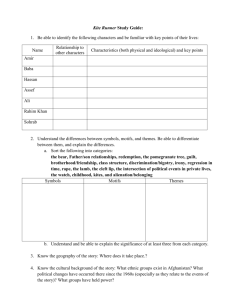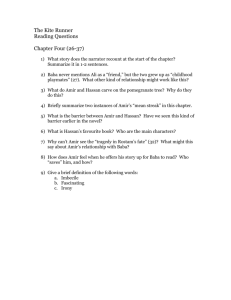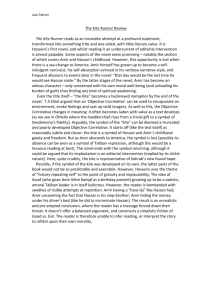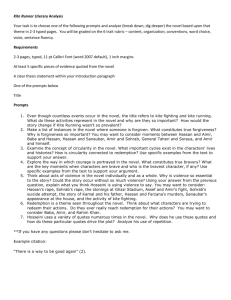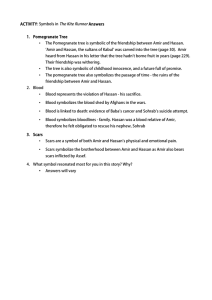Khaled Hosseini's first novel The Kite Runner
advertisement
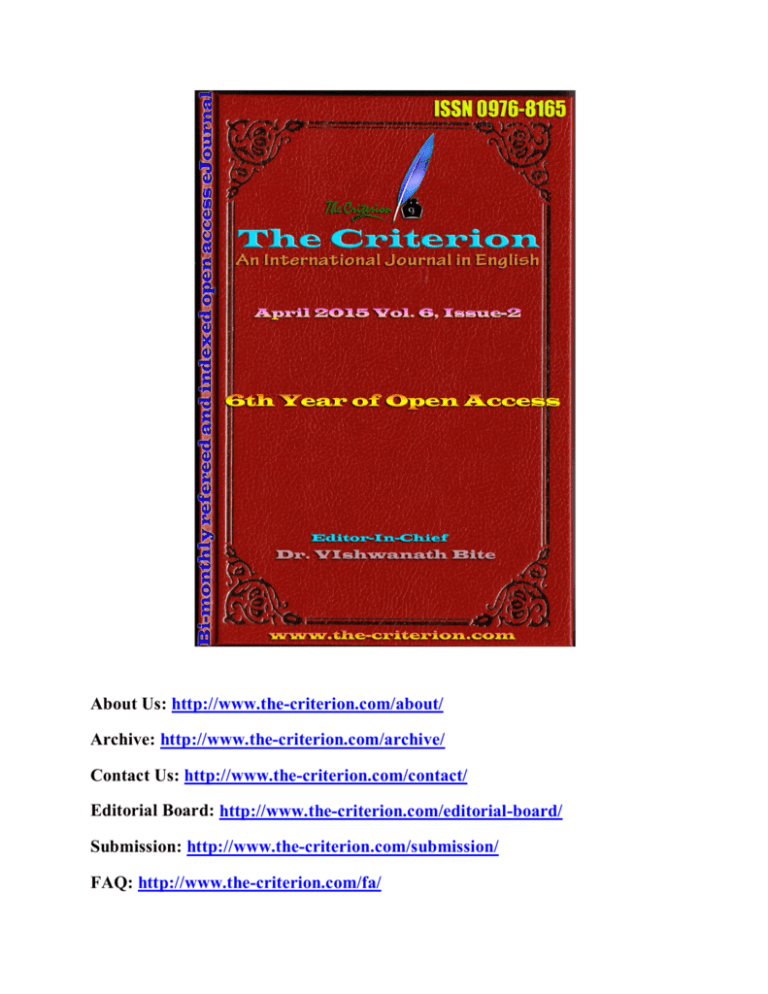
About Us: http://www.the-criterion.com/about/ Archive: http://www.the-criterion.com/archive/ Contact Us: http://www.the-criterion.com/contact/ Editorial Board: http://www.the-criterion.com/editorial-board/ Submission: http://www.the-criterion.com/submission/ FAQ: http://www.the-criterion.com/fa/ www.the-criterion.com The Criterion: An International Journal In English ISSN: 0976-8165 Sin and Redemption in Khaled Hosseini’s The Kite Runner Nadeem Jahangir Bhat Lecturer in English J&K Education Service Khaled Hosseini’s first novel The Kite Runner published in 2003 is a sensational tale of Afghanistan caught in a devastating battle between opposing forces, fighting for power and authority over the land. The story of The Kite Runner is fictional, but it is rooted in real political and historical events ranging from the last days of the Afghan monarchy in the 1970s to the post-Taliban near present. In addition to its historical background, the novel is also based on Hosseini's personal memories of growing up in the Wazir Akbar Khan section of Kabul and a subsequent migration to USA and adapting to life in California.The nightmarish saga of war torn Kabul is told in a cool and detached manner, a voice that provides a growing sense of tension and crises desperately stretched to bring to reconciliation as the story approaches its end. This tension and crises becomes a major theme of the novel. The tension that pervades throughout the novel, does not emerge from a mere juxtaposition of the opposite forces like sin and redemption, loyalty and betrayal, political and religious fundamentalism and secular liberalism; it is rather a result of failed reconciliation between the opposites that brings about the crises leading to a dilemma. For the author as well as the protagonist of the novel, Afghanistan in these turbulent times is a hell to live in. However hard they try, they fail to overcome the dilemma in a peaceful and reconcilable manner so that their nation ceases to be a hub of strife, terror and tension. Commenting on the novel, Ronny Noor asserts that “this story is about sin and redemption” (Ronny Noor, 148). We have almost all the major characters who have sinned in one way or the other. They have a guilty conscience and in order to overcome this sense of guilt or sin, they offer penance as atonement. In the novel, sin and guilt are so enduring that redemption becomes important rather inevitable to both the plot and the character development. One could easily argue that sin, guilt and redemption completely sum up the story of The Kite Runner. The Guardian review of the novel calls it a “gripping and emotional story of betrayal and redemption” (The Guardian “Review” by Charlie B). The novel is primarily about Amir and Hassan, two close friends, as good as brothers, who happen to be experts in the art of kite flying. Unfortunately, war comes to Afghanistan and the country becomes a vulnerable place to live in. Amir and his father are forced to flee Afghanistan for America, and afterwards the novel becomes “the story of Amir's quest for redemption – righting the wrongs he committed all those years ago as a boy in Kabul” (The Guardian “Review” by Charlie B). In The Kite Runner we see how destructive and powerful the guilt is and how efficiently it damages relationships and cripples the life of its vessel. We also see how the quest to alleviate this guilt is all consuming and how the road to redemption is often paved with pain and regrets. Vol. 6, Issue II 283 April 2015 www.the-criterion.com The Criterion: An International Journal In English ISSN: 0976-8165 Amir betrays his closest friend, Hassan, when they are just 12 years old. Amir was rich and Sunni, Hassan poor and Shi’a. Amir learned from his father’s friends (but not from his father) that the Hazara tribe to which Ali and Hassan belonged, were inferior people. Yet his father adored Hassan and regarded Ali as his best friend. Amir was deeply jealous of Hassan who had so many characteristics which Amir’s father admired. In a stratified society, to be poor is sin; to be powerless again is a sin. Hassan, an ethnic Hazara, is an embodiment of these sins. In fact, for Hassan to be sinless is a sin. An expatriate in his own motherland, a child of an illegal affair, in innocent, guileless and guiltless Hassan is a devotee performing all his duties to serve his master Baba and his son Amir. In order to recompense his guilt he pays heavily, in fact, pays more than a fair price, a ruthless perseverance, of bitter patience and an unswerving loyalty but never comes to terms with reconciliation, with and within the all inclusive homogeneity of a nation. Assef, the antagonist of the novel, a perverse and haughty boy reminds Hassan of his ethnic identity when he says: “Afghan is the land of Pashtuns. It always has been, always will be. We are the true Afghans, the pure Afghans, not his Flat-Nose here. His people pollute our homeland, our watan. They dirt our blood… Afghanistan for Pashtuns, I say’ (The Kite Runner, 35). The Kite Runner tackles the issue of ethnic discrimination in Afghanistan with an example of the relationship between Pashtuns and Hazaras. Baba's father sets an example for him of being kind to Hazara people, even though they are historically demeaned and persecuted. He could have easily sent Ali, the son of his Hazara servant, to an orphanage after his parents' death, but chose to raise him in his household. Baba does the same with Hassan, although this is complicated by the fact that Hassan is actually his son. Even in Baba's house, the house of best intentions, the class barrier between the Pashtuns and Hazaras endures. Ali is as dear to Baba as a brother; he calls him "family." But Ali still lives in a hut and sleeps on a mattress on the floor. He tends the garden, cooks, and cleans up and raises Hassan to do the same. So strong is Hassan's identity as a servant that even as an adult, when Baba is gone, he has no sense of entitlement. He insists on staying in the hut and doing housework. When Hassan dies defending Baba's house, he does so not because he feels it belongs to him, but because he is being loyal to Baba and Amir. The pride with which Assef speaks about the pride and reputation, ‘nagoo namoos’ of the Pashtuns as the only true Afghans makes a total exclusion of anything that is non-Pashtun. Given to Assef’s nature and thinking it is quite understood as there is no love lost between him and Hassan. But what startles the readers is the assertion of Amir when he hesitates to call Hassan his friend: “But he’s not my friend! ... He is my slave”(36). Hassan’s sin is not something which he has acquired for himself. It is rather his own doing which makes him pay heavily. He stands still and silent, keeps a dogged patience and desperately waits and watches his approaching doom. Amir is a typical Afghan Pashtun who stands in absolute antithesis to Hassan. He is a modern liberal Afghan, a hero morally neither too good nor too bad, but an intermediate kind of a personality. He is not a genuine, brave hearted courageous Vol. 6, Issue II 284 April 2015 www.the-criterion.com The Criterion: An International Journal In English ISSN: 0976-8165 traditional hero, but a kind of timid and indecisive person whose timidity and selfishness lets Assef sodomize Hassan. During a kite running competition, Hassan is being attack by other Pashtuns boys, members of the privileged Sunni class. Amir does not come to his aid and allows him to be brutally sexually abused. “His shame”, according to Bob Corbett, “is complicated by his own realization that in part he doesn’t help his friend precisely because he is jealous of him as well as being cowardly” (Bob Corbett, ). Baba had proclaimed “a boy who won’t stand up for himself becomes a man who can’t stand up to anything” (194). This is what exactly Amir turns out to be. His timidity, like a shadow, remains with him throughout his life and its poison lingers with him all the time. However, he realizes his true nature only after he grows insomniac. “I had one last chance to make a decision. One final opportunity to decide who I was going to be. I could step into that alley, stand up for Hassan- the way he’d stood up for me all those times in the past- and accept whatever would happen to me. Or I could run. In the end, I ran. I ran because I was a coward. … I actually aspired to cowardice” (68). Amir is not just a coward; he is also a cunning demon, a self righteous monster, an imposter who thinks “may be Hassan was the price I had to pay, the lamb I had to slay, to win Baba” (68). He could have stepped into the alley, stood up for Hassan and saved him from the sexual assault of Assef, but he does not, not only because he is a coward but also because Hassan was a Hazara “a fair price”. Amir does not seek punishment, it befalls him. He is overtaken by Hamlet’s curse and he curses his predicament. When Hassan has a dream of swimming in a lake, Amir comes up with an interpretation of what Hassan had seen: “I thought about Hassan’s dream, the one about swimming in the lake. There is no monster, he’d said, just water. Except he’d been wrong about that. There was as grabbled Hassan by the murky bottom. I was that monster” (TKR, 75). In order to get rid of Hassan he implicates him in a theft. The result is that “his own shame drives him nearly crazy and in anguish to end his pain, he sets Hassan and his father up for a shame so great they have to leave the home”. Ironically, trying to solve his problems by casting Hassan out of his way, this “further treachery doesn’t end the shame, but intensifies it” ( Bob Corbett,). The tension of sin and redemption does not end here; it follows throughout the novel relentlessly. It is not only the politics of sin that Hosseini ventures to delineate but also the reality of redemption he brings into limelight. The tension is actually never resolved and the issue is left maiden. Even at the end of the novel when Amir adopts Sohrab, there are many doubts and quarries raised in this regard. Had Soraya, Amir’s wife, not been infertile, would he still adopt Sohrab? A host of similar questions mark on the reckoning. Vol. 6, Issue II 285 April 2015 www.the-criterion.com The Criterion: An International Journal In English ISSN: 0976-8165 All the major characters in the novel have typical characteristics that characterize the Afghan ethos. If we apply the Johnsonian theory of ‘Humors’, all the major characters have one or the other qualities and typicalities and Hosseini exaggerates these typicalities. His characters are not entirely good or bad; some of them are innocent, pure at heart while some others are haughty, cunning and fake conceited. Baba has some good traits and qualities but he is an adulterator. Similarly, Amir is an imposter, Ali a butt of ridicule, Hassan a ‘goddamn loyal dog’ and Assef an incarnation of Satan himself. Baba’s false pride never lets him atone for his sins, except he stealthily loves the legacy of his sin, Hassan. He dies a high headed liberal humanist, but un-atoned and unpardoned. Amir oscillates between reverie of his sin and psychological crises caused by it. Still, he assumes the posture varied pretensions to overcome the guilty complex. The profound feeling of regret and the incapacity for confession makes him insomniac. He doesn’t have the courage to own and accept Hassan as his brother. It is ironic that what he ‘fears the most’ is Hassan’s ‘guileless devotion’. Although he adopts Sohrab but this fatherhood is only his own conjectured atonement for his sin. Works Cited: 1. Noor, Ronny. "Afghanistan: The Kite Runner." Rev. of The Kite Runner, by Khaled Hosseini. World Literature Today Sep.-Dec. 2004: 148 2. Charlie, B. The Kite Runner by Khaled Hosseini: The Guardian “Review”, 28 July 2014. 3. Corbett, Bob. ‘Review’ The Kite Runner by Khaled Hosseini, New York: Riverhead Books, 2003. 4. Hosseini, Khalid. The Kite Runner, London: Bloomsbury, 2003. 5. Hill, Amelia. "An Afghan Hounded by his Past." Rev. of The Kite Runner, by Khaled Hosseini. Guardian Unlimited Books. 7 Sept. 2003. Accessed 27 June 2006. Vol. 6, Issue II 286 April 2015
